Gaps in UK law that would allow words such as “jihad” to be shouted at rallies were known to the government but not acted upon, Britain’s former head of counter-terrorism has revealed.
The comments from Neil Basu come as some ministers condemned police for their handling of weekend demonstrations in London, with the home secretary, Suella Braverman, due to meet the Metropolitan police commissioner on Monday.
In 2021 the Conservative government was told laws should be toughened in a report on tackling extremism co-authored by Sir Mark Rowley, now head of the Met, with the conclusions supported by counter-terrorism policing.
On Sunday Robert Jenrick, the immigration minister, said that people chanting “jihad” on the streets of London were inciting terrorist violence and should be tackled with the full force of the law. He appeared to criticise the Met, saying they would be spoken to by government.
The Met said it had reviewed a video from a Saturday rally in London organised by the fundamentalist group Hizb ut-Tahrir, in which a man talked about Palestine, asked what the solution was, before the word “jihad” can be heard.
The Met said “jihad” had numerous meanings and it believed after consultation with the CPS that no offence had been committed.
The Hizb ut-Tahrir rally was separate from a much larger pro-Palestine rally of about 100,000 people in London.
The comments from Jenrick, who sits in the cabinet, clash with the position of the Met, which said they took no action because shouting “jihad” is not against current terrorism or public order laws.
Experts in terrorism laws said the Met’s position was correct.
In 2021 Rowley co-authored a report for the commission on countering extremism, which advises the government, warning of a “gaping chasm” in laws allowing “extremists to operate with impunity”.
In 2023 the report into the Manchester bombings revealed that two years after the report, the home secretary was still considering it.
Sir John Saunders, who chaired the inquiry and inquests into the 2017 Manchester Arena bombings, urged the government to hurry up and said: “I recommend that such consideration be given as a matter of urgency.”
Following Jenrick’s remarks, Basu, who was formerly Britain’s most senior counter-terrorism officer and an assistant commissioner in the Metropolitan police, told the Guardian that the government had been warned, but did not act.
Basu said: “Your eyes were opened to the glaring anomaly in the law. You did not take it up at the time and it is worth revisiting. The report from the commission for countering extremism in 2021 pointed out a series of gaps in the law.
after newsletter promotion
“For the government and ministers to attack the Met is thus unjustified. The police need support at this challenging time. If the government don’t like the law, it can change it, as it has been asked to do.”
The Met had lawyers specialising in counter-terrorism law from the Crown Prosecution Services in its control room monitoring the protests, alongside police commanders on Saturday.
In a statement on Saturday, the Met police said it and lawyers from the CPS had come to the same conclusion about the clip of the man chanting jihad.
But it added: “Recognising the way language like this will be interpreted by the public and the divisive impact it will have, officers identified the man involved and spoke to him to discourage any repeat of similar chanting.”
Jenrick told LBC: “I think a lot of people would find the Metropolitan police analysis surprising, and that’s something that we intend to raise with them and to discuss this incident with them.”
On Monday Braverman will meet Rowley to discuss issues from the weekend’s protests among other things. The meeting was scheduled before this weekend’s events.
The commission on countering extremism’s report in 2021 found gaps in the law allowed someone to “glorify terrorism, so long as one avoids encouraging the commission, preparation, or instigation of acts of terrorism or related offences”.
In 2021 Rowley was a private citizen, having left the Met in 2018 where he had served as head of counter-terrorism. In 2022 he returned as commissioner.









